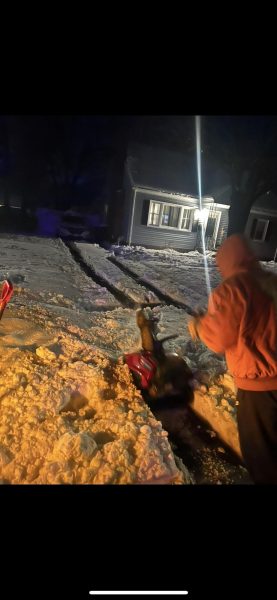Turkey Is Rebuilding, but Are They Setting Themselves Up for Another Disaster?
After its record earthquake on February 6th, Turkey is rebuilding what has been destroyed. Infrastructure is being built at an astounding rate, but many are left to wonder if their hasty rebuild is setting them up for yet another catastrophe in the future.
February 6th was a date memorable for all the wrong reasons for Turkish people. An article by CNN stated that “The devastating earthquake that hit Turkey on February 6 killed at least 45,000 people, rendered millions homeless across almost a dozen cities, and caused immediate damage estimated at $34 billion – or roughly 4% of the country’s annual economic output, according to the World Bank.” The economic impact this disaster had on Turkey was astounding. “The Turkish government needs to successfully assess the damage caused by the earthquake and then must increase its spending drastically to rebuild,” says Mrs. Peling, an Economics teacher at Hall High School. “The loss of workers as well as the loss of physical capital has a huge impact on Turkey’s economy now, and in the future.”

There have also been large environmental impacts as a result of the disaster. “The earthquake also could be creating further problems underground,” says Dr. Coghill, an AP Environmental Science teacher at Hall. “Tanks of oil or gas beneath the ground may have ruptured and their substances could have leaked into the groundwater, polluting it and making it dangerous to consume.”
How did Turkey allow such a devastating event to happen? According to CNN, “The funds created for earthquake preparedness have been used for projects such as road constructions, infrastructure build-ups, etc. other than earthquake preparedness,” said Tunca. “In other words, no buffers or cushions have been set in place to limit the economic impacts of such disasters.” Without this money reserved for such disasters, Turkey is not able to employ a plan to successfully rebuild.
Constructing earthquake-resistant structures in areas that can have seismic events is crucial to maintaining infrastructure that lasts for many years. “… structural and nonstructural components of a building need to be interconnected so inertial forces dissipate,” states Eastern Kentucky University’s Safety Management. “If the structure is not comprehensively tied together, components will move independently and collapse will be imminent. The continuous load path is the earthquake’s journey through the building – laterally and vertically. It is vital the path is intact or else it won’t be able to dissipate an earthquake’s powerful shudders.”
Unfortunately, due to a lack of money and the desire for a quick recovery, Turkey is hastily rebuilding what has been destroyed. According to the Independent, following the earthquake, the Turkish President “…promised more than 400,000 new housing units, with construction beginning this month. However, urban planning experts worry that building at such a fast pace in a region that is still suffering aftershocks will yield the same kind of substandard construction that they believe contributed to the enormous death toll of the earthquakes.” This quick rebuild prioritizes the near future of housing those who currently are homeless but is putting many at risk for another earthquake in the following years who could be displaced from their homes yet again.
The Independent states that, “Geologists and urban planners said it was a grave mistake to rush into building projects without thorough geological surveys in an area where the earth has yet to settle. Seismologists have recorded nearly 10,000 aftershocks since 6 February and warn that tremors could continue for up to two years.” This means that there is a potential for many of these newly-constructed buildings to fall soon due to the ground not restabilizing following the earthquake.

Turkey is getting help with rebuilding from many countries, including the United States. In a statement from the US Department of State, “The State Department and USAID are working through UN agencies and NGOs to provide emergency assistance in Türkiye and Syria, including hot meals, water, medical care, and supplies; non-food items such as blankets, clothes, and hygiene kits, temporary shelter, and structural engineers; and essential mental health and psychosocial support – especially to affected children and to other vulnerable individuals.”
To help Turkey recover from this disaster, donate below to UNICEF to aid children who have been affected.





